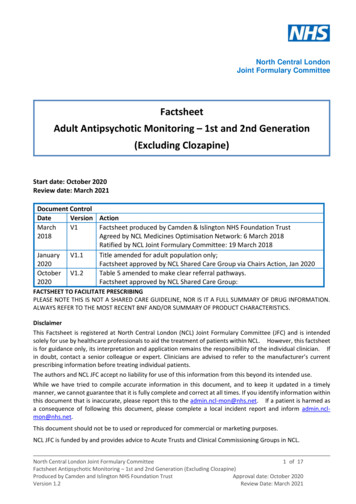
Transcription
Supporting aperson withmemory lossFactsheet 526LPJanuary 2021Memory lapses happen to everyone and can be caused by a number ofthings, including stress, tiredness, or the forgetfulness that often occursnaturally as people age. For a person with dementia, memory problemswill become more persistent and will begin to affect everyday life. Thiscan be difficult to cope with, both for the person themselves and for thepeople around them.However, there are ways to help a person with dementia manage theirmemory problems and stay independent for longer. This factsheetexplains the impact of memory loss on people living with dementia. Itlooks at ways to support a person with memory loss and offers practicaltips and advice for carers.This factsheet is written for carers and those supporting a person withmemory loss. For advice and practical tips written directly for the personwith memory loss, see booklet 1540, The memory handbook.
2Supporting a person with memory lossContentsnn Memory loss and dementiannThe emotional impact of memory loss— Helping the person with memory loss to manage their emotions— Managing your emotions as a carer for someone with memory lossnnPractical tips for supporting someone with memory loss— Forgetting recent conversations or events— Forgetting names and words— Losing items— Having difficulties with day-to-day tasks— Getting lost outside the home— Getting lost in a home setting— Forgetting upcoming events— Struggling to recognise faces— Forgetting beliefs and aspects of identitynnStructured approaches for supporting someone with memory loss— Life story and reminiscence work— Cognitive stimulation therapy (CST)— Cognitive rehabilitationnnOther useful organisations
3Supporting a person with memory lossSupporting a person with memory lossMemory loss and dementiaIt is common for people with dementia to experience memory loss. This isbecause dementia is caused by damage to the brain, and this damage canaffect areas of the brain involved in creating and retrieving memories.Memory loss can be a symptom of any type of dementia. For people withAlzheimer’s disease, it is often among the very first signs.Memory can be affected in different ways. These include:nnnot being able to create new memories – this means that recent eventsare not ‘recorded’ in the person’s memory and so cannot be recalledlater. For example, the person may forget a conversation they havejust had.nntaking longer to retrieve information – this means that, even though theperson is still able to recall things, this takes them much longer or theymight need a prompt. For example, they might need more time to findthe name for an object.nnnot being able to retrieve information – this means that, even thoughthe person may be able to create new memories, they are not able toaccess them when needed. For example, they may get lost in familiarsurroundings or on journeys they have taken many times.
4Supporting a person with memory lossMemory loss affects everyone differently but many people with dementiaexperience some of the following:nnforgetting recent conversations or eventsnnstruggling to find the right word in a conversationnnforgetting names of people and objectsnnlosing or misplacing items (such as keys or glasses)nngetting lost in familiar surroundings or on familiar journeysnnforgetting how to carry out familiar tasks (such as making a cup of tea)nnforgetting appointments or anniversariesnnnot being able to keep track of medication, and whether or when it hasbeen takennnstruggling to recognise faces of people they know well.These changes may be more visible to family and friends than to theperson themselves. For ideas on how to support someone with thesememory problems, see ‘Practical tips for supporting someone withmemory loss’ on page 8.Older memories – which have been recalled or spoken about more often– are more firmly established than newer memories. This means that aperson with dementia may forget recent events but still be able to recalldetailed memories from earlier life.In the same way, people with dementia may still be able to rememberthings that they have repeated many times in their life, such as a route toschool. This also includes skills that involved a lot of practice, like playing amusical instrument or driving.
5Supporting a person with memory lossPeople with dementia may also be able to remember more emotionalevents such as weddings or birthday parties. This is because memory alsohas an emotional aspect to it. This emotional memory is usually affectedmuch later on in dementia.This means that a person with dementia may remember how they feelabout an event even if they have forgotten the details of it. For example,they may not remember where they went on holiday, or that a friend cameto visit, but they may still feel happy about it after.This emotional memory can be triggered by senses, such as hearinga certain piece of music or smelling a certain fragrance. For moreinformation on memory loss and the effect of dementia on different partsof the brain see factsheet 456, Dementia and the brain.The emotional impact of memory lossEveryone reacts differently to memory loss. It can cause a range ofemotions in both the person with dementia and those supporting them.Helping the person with memory loss to manage their emotionsSome people with dementia may not seem troubled by their memory loss,while others may find it frustrating and upsetting. The person may loseself-confidence and be embarrassed by their difficulties. They may beginto withdraw from social situations or stop doing things they usually do.Memory loss can also lead to people misplacing items that they then mightthink others have moved or stolen. This can sometimes cause anger andmistrust between the person with dementia and those around them. See‘Losing items’ on page 10 for more advice on this.
6Supporting a person with memory lossIt can be helpful to be aware of these difficulties and find ways to providesupport. The following suggestions might help:nnIf the person is ready to, encourage them to talk about how theyare feeling. If they are frustrated or upset because of their memorydifficulties, it can help to talk through some of the issues with them.nnLook for different ways to manage some of the day-to-day problemsthey are having. For suggestions, see ‘Practical tips for supportingsomeone with memory loss’ on page 8.nnIf the person is worried about the future, try to understand theirconcerns and help them focus on the present. Think of what they canstill do and encourage or support them to continue doing these things.There are approaches which can help rebuild confidence in people withmemory loss – see ‘Structured approaches for supporting someonewith memory loss’ on page 19.nnEncourage the person to continue spending time with other people andto take part in meaningful activities that do not rely as much on memory,such as word or number games.nnIf the person is frustrated because of their memory problems, theymay get distressed or agitated. In these cases, it may be best to gentlychange the conversation or activity. For more information on changesin behaviour and tips on how to cope with these see factsheet 525,Changes in behaviour.
7Supporting a person with memory lossManaging your emotions as a carer for someone with memory lossIf you are supporting a person with dementia who is living with memoryloss, you are also likely to feel a range of emotions. For example, if theperson is recalling earlier happy memories, it can sometimes be nice toreminisce together. This can make you feel closer to the person.But it can also be difficult to care for someone with memory loss. Forexample, you may feel embarrassed if the person forgets who someoneis, or if they no longer remember how to carry out a task. Or you mightfeel sad that the person has forgotten memories that you share withthem. It can be tiring and frustrating to be asked the same question manytimes, and this might make you feel guilty. You may also feel unsure aboutwhat you can talk about with the person without relying too much ontheir memory.It is natural to feel these emotions when caring for someone with memoryloss. Reminding yourself that the person’s difficulties are because oftheir dementia may help you to deal with these feelings. It is also worthreminding yourself that, by supporting the person, you are making apositive difference to their life. If you need advice or support, you can callAlzheimer’s Society on 0333 150 3456.When caring for someone else, the needs of that person often comebefore your own. This can make it difficult for you take care of yourself.However, it is just as important to look after your own physical and mentalhealth. For more advice on improving your wellbeing see factsheet 523,Carers – looking after yourself. You might also find it helpful to join a localsupport group for carers. Use our dementia directory tool to find one nearyou – alzheimers.org.uk/dementiadirectoryIf you are trying to process how the person’s memory loss is makingyou feel, you may find a talking therapy useful. These will allow you toexplore your feelings in private. To get in touch with a therapist, you canspeak to your GP or you can find a private therapist by contacting theBritish Association for Counselling and Psychotherapy (see ‘Other usefulorganisations’ on page 21). For more information on talking therapies, seethe section on carer support in factsheet 444, Supporting a person withdementia who has depression, anxiety or apathy.
8Supporting a person with memory lossPractical tips for supporting someone with memory lossThere are many practical ways that you can support a person withdementia who is having difficulties with their memory. Some suggestionsare listed in this section.There are also more structured approaches that can improve the person’squality of life on a more long-term basis. For more information on these,see ‘Structured approaches for supporting someone with memory loss’ onpage 19.It is important to support the person with dementia to do as much aspossible, and for as long as possible.Forgetting recent conversations or eventsPeople with dementia may find it hard to remember recent conversationsand events, even in the early stages. It is important to keep in mind thatthe person isn’t being difficult. Due to the damage that is causing theperson’s dementia, their brain may not have stored the information. Thismeans that they cannot bring back the memory of the event or discussionbecause they may not have that memory.How you can helpnnPictures and written descriptions can be useful records of things thathave happened. Encourage the person to use a diary, journal or calendarto record events and conversations.nnIf the person repeats a question, it won’t help to tell them that they haveheard the information before. Give simple answers and repeat them asneeded. You can also write the answer down so that the person has anote of it.nnIf the person can’t remember whether they have done something or not,try to give context to your question and include prompts. For example,‘It must be a while since you ate breakfast, are you hungry?’ rather than‘Have you had breakfast?’.nnIf the person does not remember a conversation you have had with themrecently, keep in mind that this is not because they weren’t listening. Ifthe conversation was important, it might be worth having it again.
9Supporting a person with memory lossForgetting names and wordsPeople with dementia may have difficulties finding the right word in aconversation. They might feel stuck because the word is ‘on the tip of theirtongue’. They may confuse one word for another – for example saying‘glue’ instead of ‘shoe’. They may also forget the meaning of certain words.In a similar way, a person with dementia might forget people’s names, eventhose of friends or family members whom they have known for a long timeand are close to.These difficulties can make it harder to communicate with a person withdementia. However, there are a number of ways to support conversation.How you can helpnnIf the person is tired or stressed, it will be harder for them to rememberwords and names. If this is the case, it might be better to have theconversation at a different time, when the person is feeling more relaxed.nnIf the person is struggling to find a word, don’t rush them. Give themenough time to say what they are trying to say. If they feel underpressure, this might make it more difficult for them.nnIf you are not sure what the person is trying to tell you, consider thecontext of what they are saying. This may give you clues about the wordthey are looking for.nnIf the person doesn’t understand a word you are using, try usingprompts, cues and context to help with naming items. The person mayrecognise an object and what it is used for, even if they can’t rememberwhat it is called.nnIf the person is struggling to remember someone’s name, don’t put themon the spot. Instead, try to find tactful ways to remind them withouthighlighting that they have forgotten the person’s name – for example,‘Here’s your friend, Elena’.nnAsk the person if it would be helpful for other people to introducethemselves before they speak. This may depend on how the person withdementia feels about their memory difficulties and whether they arehappy for others to know about these.
10 Supporting a person with memory lossnnConsider using a ‘memory book’ or ‘memory box’ with photos and briefinformation on people (such as their name and the story of how theperson knows them). The person with dementia can then refer to this ifthey want to.For more ideas on ways to communicate with a person with dementia seefactsheet 500, Communicating.Losing itemsPeople with dementia often lose items as a result of their memory loss.They may misplace common items, such as glasses or keys, or put an itemsomewhere for safekeeping and then forget where it is. They may also leaveitems in unusual places – for example, leaving the remote control in thebathroom, or tea bags in the fridge.If the person thinks an item should be somewhere and it’s not, this may leadthem to think that someone is hiding or stealing things from them. This isa type of delusion. It can be difficult both for the person and those aroundthem. It can help to try see things from their point of view. The person withdementia is trying to make sense of their reality and what is happening. Formore information on delusions see factsheet 527, Changes in perception.It is also important to note that there may be truth in what the person issaying – don’t dismiss it because they have dementia.How you can helpnnTry to keep items in places where the person is used to them being – forexample, hanging keys on a specific hook or always keeping them in thesame drawer.nnConsider getting copies of items that are important or often misplaced,such as keys, glasses or important documents.nnKeep rooms and drawers tidy so that things are less likely to get lost andeasier to find if they are misplaced. Put items that are often used wherethey can be seen and are easily accessible.
11 Supporting a person with memory lossnnConsider getting a tray marked ‘letters’ or ‘post’ to make sure that thesedo not get misplaced. This can also allow you to double-check importantitems such as GP appointment letters or test results, as long as theperson consents to this.nnUse visual clues to explain where items go, such as pictures or photosstuck to cupboard doors as reminders of what goes inside them.nnConsider a locator device to help find items that often get lost, suchas keys. For more information on these see factsheet 437, Usingtechnology to help with everyday life.nnWhen looking for a lost item, use your knowledge of the person to helpyou think where they might have put things.nnIf the person puts items in unusual places but this doesn’t pose a risk toanyone in the household, it may be best to leave things as they are.Having difficulties with day-to-day tasksAs dementia progresses, the person will have more difficulties with dailytasks, such as getting dressed, making a cup of tea, or taking medication.This may be because these tasks involve following a set of steps, and theperson with dementia cannot remember in what order these steps aresupposed to be followed.When a person begins to have difficulties with familiar tasks, it can beworrying for those around them. You may be concerned about the person’ssafety and their ability to manage. You may feel that you have to stopthe person from doing certain tasks, or start doing these tasks for them.However, it is important to support the person to do as much as possiblefor themselves, for as long as they can.
12 Supporting a person with memory lossHow you can helpnnHelp the person to perform tasks by breaking them down into smaller,simpler steps. It can help to write short instructions and place themnearby.nnConsider the time of day when the person is usually more able toconcentrate and try to schedule tasks for these times if you can. Forexample, they might find it easier to focus in the morning.nnTry to keep to the person’s usual routine. This gives a framework to theday or week that doesn’t rely on the person’s memory. For example, ifthe person always watches the news at 5pm, or goes to the shops ona Thursday, then continuing this routine can help them stay orientedand engaged.nnReduce distractions, such as background noise, to help the person focuson the task at hand.nnMake sure that items that the person uses regularly are clearly visibleto them. Make tasks easier by putting out the items which the personwill need to complete that task – for example, place tea bags and a mugnear the kettle.nnUse reminders, such as sticky notes or a wall calendar, for one-off tasks.Set up more permanent reminders for regular tasks – for example, putup a sign by the front door to remind the person to take their keys andwallet if they leave the house.nnThink about using assistive technology. These are devices that canhelp people with dementia manage everyday activities – for example,using electronic pill boxes to remind the person to take daily medication.Assistive technology can also help to reduce danger – for example,through using gas valves and smoke alarms. For more information seefactsheet 437, Using technology to help with everyday life.nnTalk to an occupational therapist. They will be able to advise on copingstrategies and suitable devices for help with day-to-day tasks. Formore information see factsheet 429, Using equipment and makingadaptations at home.
13 Supporting a person with memory lossGetting lost outside the homeA person with dementia may want to leave the house for any number ofreasons. These could include exercising or going to the shops. This typeof activity can help the person maintain some independence and boosttheir wellbeing.Such a trip may involve the person taking familiar routes or headingtowards an area that they know well. Despite this, a person with dementiamay set off somewhere and then forget where they were going or why.They may also have problems recognising their environment and this canlead to them getting lost or coming to harm. This can be distressing for theperson and for their carer.It can be especially worrying if the person gets lost while driving. If thisis the case, the person with dementia may have to stop driving, or youmay need to look at ways to manage this, such as only driving withanother person in the car. For more information see factsheet 439,Driving and dementia.How you can helpnnIf the person gets lost when going out alone, consider going out withthem, or arranging for someone else to do so.nnIf the person is happy to, it can help if other people who live nearbyare told about the person’s difficulties. This can include people likeneighbours and local shopkeepers. They may be able to help if theperson gets lost.nnThe person may find that having a mobile phone is useful. There areeasy-to-use mobiles available if the person is not used to having one.These are available to buy from Alzheimer’s Society’s online shop (see‘Other useful organisations’ on page 21).nnConsider using other assistive technology products, such as a GPSdevice. These use satellite technology to locate the person if they getlost. This can be reassuring for both the person and those around them.For more information see factsheet 437, Using technology to help witheveryday life.
14 Supporting a person with memory lossnnMake sure the person has some form of identification when they go out,as well as contact numbers of people they know well. An emergencyidentification device, such as those provided by MedicAlert, may behelpful (see ‘Other useful organisations’ on page 21). Alzheimer’s Societyalso provide helpcards that people with dementia can carry aroundwith them in case they need assistance when out in the community.These are available to order from alzheimers.org.uk/form/order-freepublicationsFor more advice on managing the risks of a person with dementia gettinglost outside the home see factsheet 501, Walking about.Getting lost in a home settingPeople with dementia may forget the layout of the home they are in andbecome confused about where each room is located. This can lead to theperson getting lost within the home.Sometimes, a person with dementia does not recognise the house theyare in at all. As their dementia progresses, they may say that they want to‘go home’, even when they are in a home setting. This could be becausethe person does not remember that the place they are now is where theycurrently live. They may be recalling a former home, such as where theylived as a child, and be confused that they are not there now.In some cases, this isn’t about wanting to return to an actual home, butabout returning to that feeling of ‘home’. This can happen if the personfeels uncomfortable or distressed, and is looking for the positive emotionsassociated with being at home.
15 Supporting a person with memory lossHow you can helpnnIf the person is recalling a home that they used to live in, speak with themabout this other home, and what it means for them. This may help themto place it in the past.nnDon’t try to convince the person that they are home, or that this is wherethey live now. Instead, reassure them that they are safe, and encouragethem to talk about the way they are feeling. For example, ‘What is it thatyou like about your home?’ – this may help you to work out what theperson needs in order to feel more comfortable.nnMake sure that the person is surrounded with familiar items that will helpthem feel at home. This can include ornaments, photographs, or otherobjects with a personal connection.nnKeep a reminder of the current home address by the front door, in theliving area or in the person’s room. This can help to remind the person ofwhere they are.nnIf the person forgets the layout of the home, try putting up signs oninternal doors to help them find the bathroom, kitchen and other roomsthey may use regularly. Dementia-friendly signs are available to buy fromAlzheimer’s Society’s online shop (see ‘Other useful organisations’ onpage 21).nnLeave internal doors open so that the person can see easily into eachroom and consider leaving the bathroom light on during the night. Formore tips on making the home a better space for people with dementiasee booklet 819, Making your home dementia friendly.Forgetting upcoming eventsPeople with dementia may forget upcoming events such as medicalappointments, visits and anniversaries. This can cause problems if you’renot always around to remind the person beforehand.How you can helpnnThink about how the person remembered events in the past. Using asimilar technique is likely to work better than trying to learn a new one.
16 Supporting a person with memory lossnnHelp the person to use calendars and clocks to remind them ofupcoming events. Place them where the person with dementia will seethem, such as on the bedside table or by the phone.nnIf the person has an online calendar on their mobile phone, tablet orcomputer, consider entering reminders for upcoming events andappointments. Virtual assistants such as Amazon’s Alexa and Apple’s Sirican also be useful for this purpose.nnIf the person is given an appointment card, put it where the person caneasily see it. For example, you could pin it to a noticeboard.nnIf the person uses a mobile phone, ask whether a reminder text couldbe sent to them before their appointment (for example with the doctor,dentist or hairdresser). If the person gives their consent, the remindercould also be sent to your phone.Struggling to recognise facesAs the person’s dementia progresses, they may begin to have difficultyrecognising familiar faces, including their own reflection. This can makethe person feel as though there are intruders in their home – for example,if they see their reflection in a mirror and don’t recognise themselves, ordon’t recognise friends who have come to visit.People with dementia may also experience ‘time-shifting’. This is whenthe person believes that they are living at an earlier time in their life andthat they are younger than they are now. They also expect the peoplearound them to be younger as well. This can then lead to them mistakingyounger relatives for people they know or used to know. For example, theymay think that their child is their partner or that their brother or sister istheir parent.In the same way, when the person is time-shifted, they may not recognisetheir children. This could be because they don’t believe that they are oldenough to have children, especially adult children. For more information ontime-shifting see factsheet 527, Changes in perception.
17 Supporting a person with memory lossNot recognising familiar people can be distressing for both the personwith dementia and those around them. It is important to try not to takeit personally. Even if the person doesn’t seem to recognise those mostfamiliar to them, they will still have an emotional attachment to thosepeople and will still feel close to them. For example, they may not recognisethat you are their child or partner, but they will know that you are a personwho makes them feel safe or happy.How you can helpnnTry to find tactful ways to give the person cues or reminderswithout mentioning their memory loss – for example, ‘Hasn’t ourgranddaughter grown?’.nnConsider using aids like a ‘memory book’ that includes pictures of familyand friends or keep albums and photos nearby.nnReassure the person and try to make them feel safe and comfortable. Ifthey don’t recognise people, they may feel that they are surrounded bystrangers and get distressed.nnTry not to show the person that you are offended or upset if they do notrecognise you – it is unlikely to be a personal rejection. Try to focus onhow the person responds to you in the moment. For example, even ifthey don’t seem to recognise you, they may still smile at you or want tospeak with you.nnSomeone with dementia may still be able to recognise people’s voicesor the way they smell. Hearing a person speak or smelling someone’sperfume or aftershave may help them to recognise that person.If someone you care for does not recognise you, this can be upsetting.Try to talk about how you feel with someone you trust. Talking Point isan online discussion forum where you can talk with other people whoare going through similar things. They may be able to give advice, sharepractical suggestions, or just offer understanding. Go toalzheimers.org.uk/talkingpoint
18 Supporting a person with memory lossForgetting beliefs and aspects of identityAs the person’s dementia progresses, they may forget or misremembercertain beliefs or aspects of their identity which have been important tothem. This can include religious beliefs and practices, aspects of sexualorientation and gender identity, and dietary choices, such as being veganor vegetarian.It can be difficult to know what to do in these situations. Try to use whatyou know about the person and respect their preferences and beliefs asmuch as possible. Always consider what is in the best interests of theperson. This will mean trying to find a balance between respecting thebeliefs that you know were important to the person before with the beliefsthat they currently hold, which may be different.How you can helpnnIf the person has forgotten that they used to follow a particular diet,such as veganism, they may now want to eat certain foods that theydid not used to eat. However, if the person eats types of food that theyhave not eaten for some time (or ever), this could affect their digestion.If possible, speak to a dietician or to the person’s GP before the personbegins eating these foods. For more advice on this see factsheet 511,Eating and drinking.nnIf the person has forgotten aspects of their faith that used to beimportant to them, think of other aspects of worship that they mightstill enjoy or respond to. For example, they may still enjoy religious musicand songs, and may take comfort in holding or wearing symbols of theirfaith. There may also be religious rituals or practices that they havealways followed which they can still take part in or watch, either in personor online.nnIf a lesbian, gay, bisexual or trans person with dementia has memoryproblems, they may forget important aspects of their sexual identity.For example, they may forget that they have told their family and friendsabout their sexuality, or that they have lived openly as a different gender,possibly for a large part of their life. For more information on supportinga person with this see factsheet 480, Supporting an LGBTQ personwith dementia.
19 Supporting a person with memory lossStructured approaches for supporting someone withmemory lossThere are a number of different approaches that can help people withdementia cope with memory loss and the feelings
memory problems, see 'Practical tips for supporting someone with memory loss' on page 8. Older memories - which have been recalled or spoken about more often - are more firmly established than newer memories. This means that a person with dementia may forget recent events but still be able to recall detailed memories from earlier life. In the same way, people with dementia may still be .










